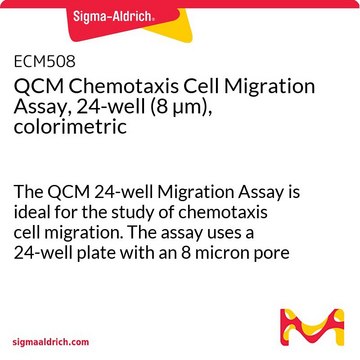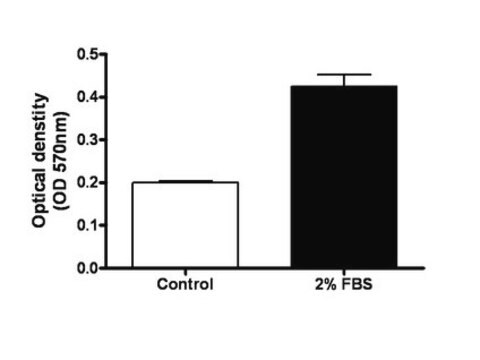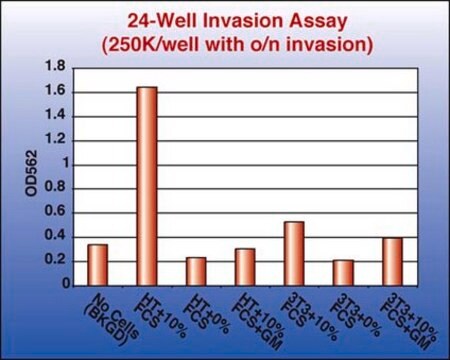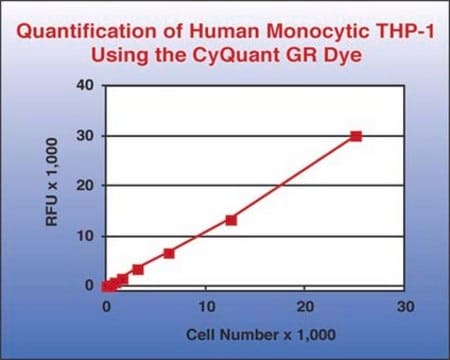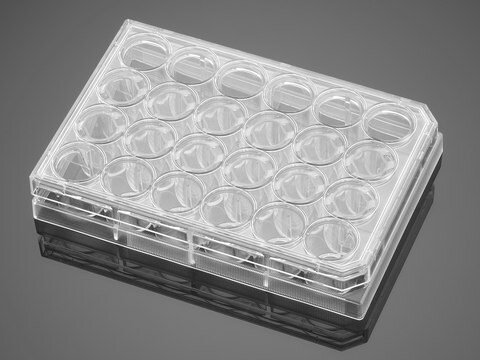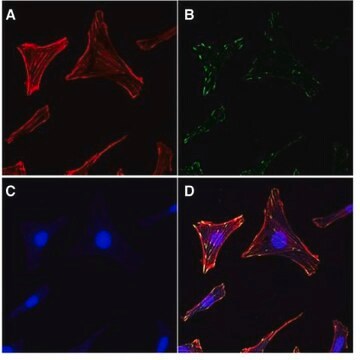ECM550
QCM ECMatrix Cell Invasion Assay, 24-well (8 µm), colorimetric
The CHEMICON Cell Invasion Assay Kit uses a 24-well plate, with 8 um pores, which provides an efficient system for evaluating the invasion of tumor cells through a basement membrane model.
동의어(들):
Basement membrane cell invasion assay
로그인조직 및 계약 가격 보기
모든 사진(3)
About This Item
UNSPSC 코드:
12352207
eCl@ss:
32161000
NACRES:
NA.84
추천 제품
Quality Level
종 반응성
vertebrates
제조업체/상표
Chemicon®
QCM
기술
cell based assay: suitable
검출 방법
colorimetric
배송 상태
wet ice
일반 설명
Also available: Cell Comb Scratch Assay! Get biochemical data from a scratch assay!Click Here
Introduction
Invasion through the extracellular matrix (ECM) is an important step in tumor metastasis. Cancer cells initiate invasion by adhering to and spreading along the blood vessel wall. Proteolytic enzymes, such as MMP collagenases, dissolve tiny holes in the sheath-like covering (basement membrane) surrounding the blood vessels to allow cancer cells to invade.
The CHEMICON Cell Invasion Assay Kit provides an efficient system for evaluating the invasion of tumor cells through a basement membrane model. The kit utilizes ECMatrix, a reconstituted basement membrane matrix of proteins derived from the Engelbreth Holm-Swarm (EHS) mouse tumor. We examined the kit′s performance using human fibrosarcoma (HT-1080) and non-invasive fibroblasts (NIH3T3).
The CHEMICON Cell Invasion Assay Kit is ideal for evaluation of invasive tumor cells. Each CHEMICON Cell Invasion Assay Kit contains sufficient reagents for the evaluation of 12 samples.
The CHEMICON Cell Invasion Assay Kit is intended for research use only; not for diagnostic or therapeutic applications.
Test Principle:
The CHEMICON Cell Invasion Assay is performed in an Invasion Chamber, a 24-well tissue culture plate with 12 cell culture inserts. The inserts contain an 8 μm pore size polycarbonate membrane, over which a thin layer of ECMatrixTM is dried. The ECM layer occludes the membrane pores, blocking non-invasive cells from migrating through. Invasive cells, on the other hand, migrate through the ECM layer and cling to the bottom of the polycarbonate membrane.
Application:
The CHEMICON Cell Invasion Assay Kit is ideal for evaluation of invasive tumor cells. Each CHEMICON Cell Invasion Assay Kit contains sufficient reagents for the evaluation of 12 samples.
The CHEMICON Cell Invasion Assay Kit is intended for research use only; not for diagnostic or therapeutic applications.
Introduction
Invasion through the extracellular matrix (ECM) is an important step in tumor metastasis. Cancer cells initiate invasion by adhering to and spreading along the blood vessel wall. Proteolytic enzymes, such as MMP collagenases, dissolve tiny holes in the sheath-like covering (basement membrane) surrounding the blood vessels to allow cancer cells to invade.
The CHEMICON Cell Invasion Assay Kit provides an efficient system for evaluating the invasion of tumor cells through a basement membrane model. The kit utilizes ECMatrix, a reconstituted basement membrane matrix of proteins derived from the Engelbreth Holm-Swarm (EHS) mouse tumor. We examined the kit′s performance using human fibrosarcoma (HT-1080) and non-invasive fibroblasts (NIH3T3).
The CHEMICON Cell Invasion Assay Kit is ideal for evaluation of invasive tumor cells. Each CHEMICON Cell Invasion Assay Kit contains sufficient reagents for the evaluation of 12 samples.
The CHEMICON Cell Invasion Assay Kit is intended for research use only; not for diagnostic or therapeutic applications.
Test Principle:
The CHEMICON Cell Invasion Assay is performed in an Invasion Chamber, a 24-well tissue culture plate with 12 cell culture inserts. The inserts contain an 8 μm pore size polycarbonate membrane, over which a thin layer of ECMatrixTM is dried. The ECM layer occludes the membrane pores, blocking non-invasive cells from migrating through. Invasive cells, on the other hand, migrate through the ECM layer and cling to the bottom of the polycarbonate membrane.
Application:
The CHEMICON Cell Invasion Assay Kit is ideal for evaluation of invasive tumor cells. Each CHEMICON Cell Invasion Assay Kit contains sufficient reagents for the evaluation of 12 samples.
The CHEMICON Cell Invasion Assay Kit is intended for research use only; not for diagnostic or therapeutic applications.
애플리케이션
Detection of migrating cells is via crystal violet stain.
Research Category
Cell Structure
Cell Structure
포장
12 wells
성분
Invasion Chamber: (Part No. 70019) One 24-well plate with 12 ECMatrixTM layered cell culture inserts.
Cell Stain: (Part No. 20294) One 10 mL bottle.
Cotton Swabs: (Part No. 10202) 24 each.
Forceps: (Part No. 10203) One each.
Cell Stain: (Part No. 20294) One 10 mL bottle.
Cotton Swabs: (Part No. 10202) 24 each.
Forceps: (Part No. 10203) One each.
저장 및 안정성
Store kit materials at 2-8°C for up to 6 months. Do not freeze.
법적 정보
CHEMICON is a registered trademark of Merck KGaA, Darmstadt, Germany
면책조항
Unless otherwise stated in our catalog or other company documentation accompanying the product(s), our products are intended for research use only and are not to be used for any other purpose, which includes but is not limited to, unauthorized commercial uses, in vitro diagnostic uses, ex vivo or in vivo therapeutic uses or any type of consumption or application to humans or animals.
Storage Class Code
10-13 - German Storage Class 10 to 13
WGK
WGK 1
시험 성적서(COA)
제품의 로트/배치 번호를 입력하여 시험 성적서(COA)을 검색하십시오. 로트 및 배치 번호는 제품 라벨에 있는 ‘로트’ 또는 ‘배치’라는 용어 뒤에서 찾을 수 있습니다.
Down-regulation of JAK1 by RNA interference inhibits growth of the lung cancer cell line A549 and interferes with the PI3K/mTOR pathway.
Dan Liu,Yi Huang,Jing Zeng,Bojiang Chen,Na Huang,Na Guo,Lunxu Liu,Hong Xu,Xianming Mo,Weimin Li
Journal of Cancer Research and Clinical Oncology null
Jung-Sun Park et al.
Journal of pharmaceutical sciences, 97(9), 4011-4019 (2008-02-02)
All-trans retinoic acid (ATRA)-incorporated nanoparticles of methoxy poly(ethylene glycol) (MPEG)-grafted chitosan were prepared through ion-complex formation between ATRA and chitosan. This nanoparticle has around 100 nm of diameter and favorable reconstitution properties. ATRA-incorporated nanoparticles has almost similar cytotoxicity against CT-26
Inhibition of CD44 expression in hepatocellular carcinoma cells enhances apoptosis, chemosensitivity, and reduces tumorigenesis and invasion.
Zhigang Xie,Pei Feng Choong,Lai Fong Poon,Jianbiao Zhou,Jiaying Khng et al.
Cancer Chemotherapy and Pharmacology null
RhoBTB2 (DBC2) functions as tumor suppressor via inhibiting proliferation, preventing colony formation and inducing apoptosis in breast cancer cells.
Mao H, Zhang L, Yang Y, Sun J, Deng B, Feng J, Shao Q, Feng A, Song B, Qu X
Gene null
The effect of a novel frizzled 8-related antiproliferative factor on in vitro carcinoma and melanoma cell proliferation and invasion.
Kristopher R Koch,Chen-Ou Zhang,Piotr Kaczmarek,Joseph Barchi,Li Guo,Hanief M Shahjee,Susan Keay
Investigational New Drugs null
자사의 과학자팀은 생명 과학, 재료 과학, 화학 합성, 크로마토그래피, 분석 및 기타 많은 영역을 포함한 모든 과학 분야에 경험이 있습니다..
고객지원팀으로 연락바랍니다.